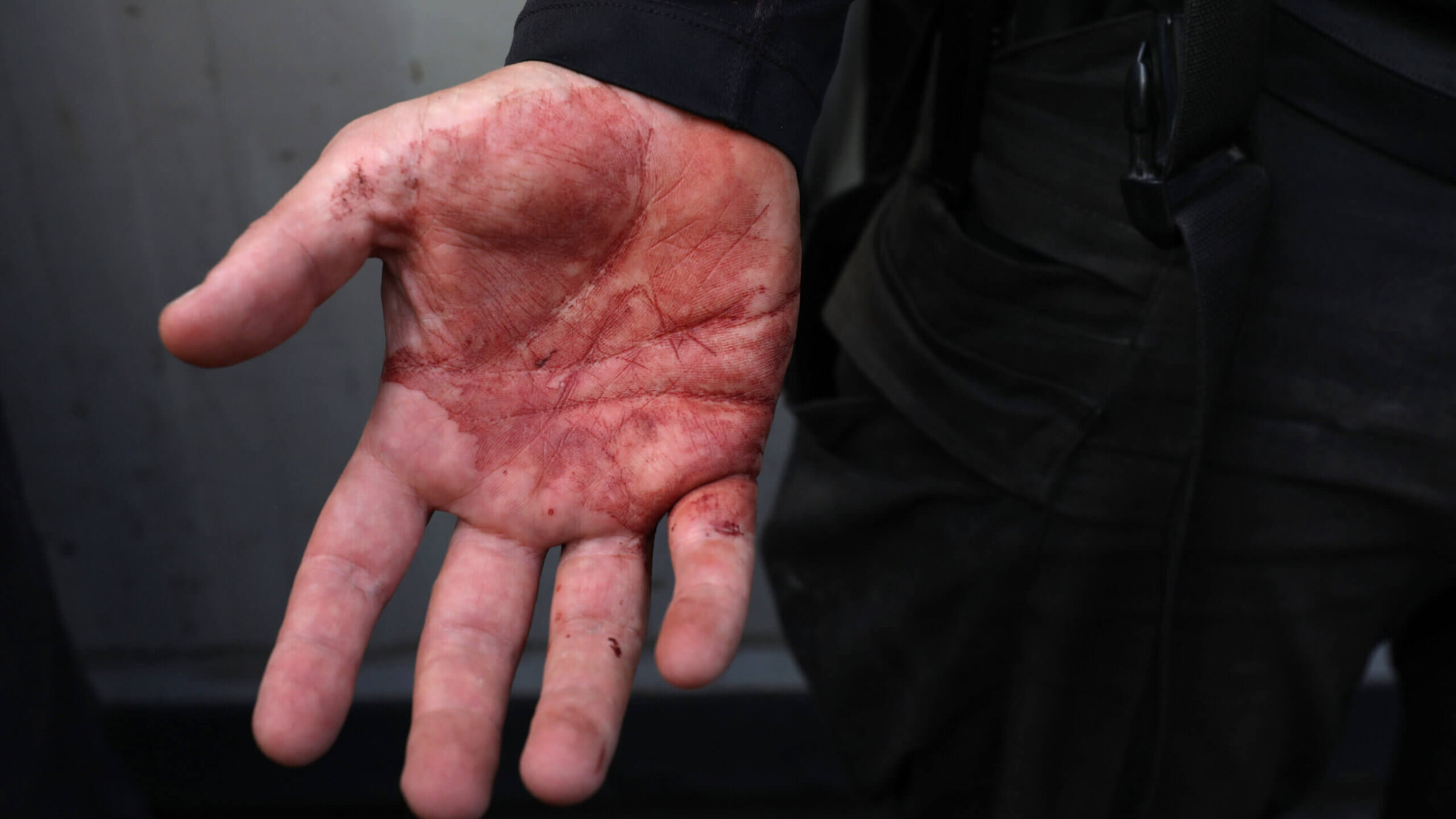An American activist was shot dead in the West Bank — advocating for peace has never been more deadly
Aysenur Ezgi Eygi, a dual American-Turkish citizen, was killed when Israeli military fired at a protest in Palestinian village

A colleague of Aysenur Eygi, an American-Turkish activist who died after reportedly being shot in the West Bank town of Beita, shows his blood-stained hand at a hospital in Nablus, West Bank, Sept. 6, 2024. Photo by AFP via Getty Images
Aysenur Ezgi Eygi, a 26 year-old American-Turkish citizen and human rights activist, died today after being shot in the head in the West Bank town of Beita, south of Nablus, during a protest that she attended as an international observer and activist. According to eyewitness reports, both the Israel Defense Forces and nearby settlers opened fire during the protests.
It is still unclear who is responsible for Eygi’s death. But in the current violent and tense reality in the West Bank — and especially in the village of Beita, which has been protesting settler encroachment for several years — a solidarity activist being shot and killed trying to protect Palestinians from settler harassment is not a surprising outcome.
For the past three years, Palestinian residents of Beita have been holding unarmed protests over the illegal takeover of their lands by the nearby Israel outpost Evyatar, a place notorious for its violence against Palestinians. Evyatar was only recently recognized as a legal settlement by the Israeli government (none of the settlements or outposts in the West Bank are internationally recognized as legal), who in the last few months declared 66 dunams (about 16 acres) of private land belonging to the villages of Beita and Qabalan as state land, in order to legalize and expand the outpost.
However, in the West Bank, any protests by, or on behalf of Palestinians, are considered as riots or “disturbance of the order” by military law, and the IDF’s rules of engagement have become increasingly permissive. In recent years there have been no consequences for soldiers who shoot at Palestinians who cause no immediate threat to Israeli troops or civilians, including if the Palestinians were throwing stones hundreds of yards away from heavily protected soldiers. In 2021, new rules were released that permit soldiers to fire at Palestinian civilians who throw stones or Molotov cocktails even if they have ceased to do so and are fleeing from soldiers.
As such, even before Oct. 7, it has become increasingly common to open fire on protests in the West Bank, including in Beita, where at least seven Palestinians have been killed during protests. According to a 2021 Haaretz article, some of them were shot and killed with a Ruger gun. This weapon is used in Israel and the West Bank in riot dispersal, since it has been classified as “non-lethal” due to the smaller bullet it uses, despite ample evidence that it has killed multiple Palestinians and one Israeli soldier in recent years.
International or Israeli activists who attend demonstrations in the West Bank do so out of a sense of solidarity, but also because it is believed to lower the level of military and settler violence. While the life of a Palestinian in the West Bank is considered expendable, an American or European citizen’s life would potentially be treated with more care and more nervousness from the side of the state to protect their lives. Eygi’s killing today shows that the stakes for solidarity activists can also be life and death.
Eygi’s killing today, in and of itself preventable and unnecessary, is already making headlines. It is not because it is rare that people die from settler and military violence in the West Bank, but because of her status as an American citizen. She is the first solidarity activist to be killed by Israeli fire since the Second Intifada, and the third in history.
This trend of firing at protesters has only increased over the past year, with Palestinians as the overwhelming victims. According to the United Nations Office for Civilian and Humanitarian Affairs, between Oct. 7 and Sept. 2 of this year, 652 Palestinians were killed in the West Bank, including East Jerusalem. Of those, 11 were killed by Israeli settlers; in seven other incidents, it remains unknown whether the perpetrators were Israeli forces or settlers. For comparison, a total of 154 Palestinians were killed in the occupied West Bank in 2022.
It is not the first time activists have been injured by the Israeli military in the area south of Nablus. On Sept. 4, dozens of settlers were documented attacking the town of Qusra, close to Beita, where they burned homes, threw rocks and shot at Qusra residents. The IDF soldiers on the ground responded by shooting in the direction of the solidarity activists and Palestinians present. Two international activists went to the hospital needing treatment.
In a video from the morgue in Nablus where Eygi’s body was brought, a fellow solidarity activist cries out: “How many more people have to die?”
That answer came too quickly. In the hours following Eygi’s killing today, tragedy was already repeated. Two villages over from Beita, Israeli settlers threw stones and set fields on fire in the village of Qaryut. According to eyewitnesses, the Israeli military opened fire on Palestinians who had responded to the violent settlers inside their village, killing a 13-year-old Palestinian girl, Bana Laboum, inside her home.
In the past years, multiple Palestinian Americans have been killed in the West Bank with near impunity from both Israel and the United States, including the acclaimed journalist, Shireen Abu Akleh. It is too soon to tell what consequences Eygi’s death will have for Israel — the White House has requested an investigation into the circumstances surrounding her killing — and the broader Israeli-Palestinian conflict itself. Perhaps this tragedy will spur true justice and accountability.
It is undeniable, however, that activists who choose to stand in solidarity with Palestinians in the West Bank are risking their lives, as are the thousands of Palestinians protesting weekly to demand rights, dignity and ownership over their land.






















